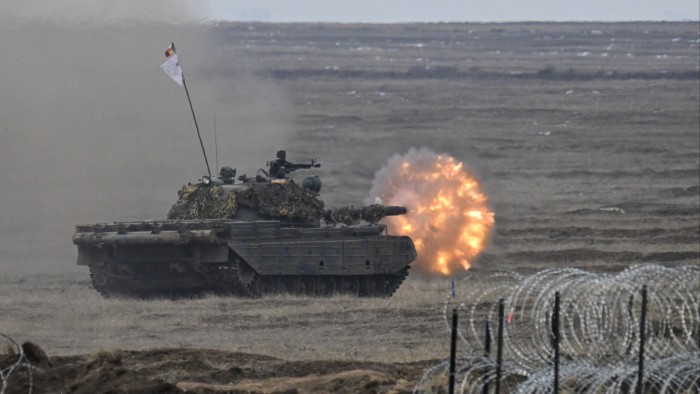Good morning. More bad news for Ukraine: Italy’s Prime Minister Giorgia Meloni is skipping a virtual G7 leaders’ summit on the third anniversary of Russia’s invasion, even as the US refuses to agree to a joint statement referring to Moscow’s “aggression”.
Today, I reveal new research on the financial cost of Europe taking care of its own defence and security, and our trade correspondent wonders if Europe has blinked first in the tariff war.
This weekend and next, we’ll have a special edition for the German elections, in English and in German.
Mind the gap
Europe needs to recruit 300,000 new soldiers, acquire 1,400 new tanks and roughly double its defence spending over the next five years to be able to defend itself without the support of the US, research warns.
Context: US President Donald Trump’s vociferous threats to withdraw the generations-old American military support line to Europe, and his rapid push to seal a peace deal with Russia has turbocharged thinking in capitals about the future of the continent’s security.
Guntram Wolff, senior fellow at Bruegel and the Kiel Institute for the World Economy, said the US’s abrupt change of direction had come as a “shock” to Europe.
“Europe’s political system and I think also the military-security bubble . . . have been living in a, let’s say, 50-year period of always thinking Nato and the US are there and basically covering their backs,” he said. “The realisation that this is not the case any more will take time to sink in, and it will not be an easy process at all.”
In Wolff’s study released today and previewed by the FT, he calculates that to be self-sufficient on defence, Europe would have to spend an additional €250bn a year “in the short term”, equivalent to roughly doubling collective defence spending to 3.5 to 4 per cent of GDP.
That should be spent on 50 new brigades meaning roughly 300,000 new troops, to make up for the US soldiers who are currently stationed in Europe, plus those who have been pledged to arrive in the event of an attack.
In addition, the money should fund 1,400 tanks, 2,000 infantry fighting vehicles and 700 artillery pieces. That, Wolff notes, is “more combat power than currently exists in the French, German, Italian, and British land forces combined”.
The current Nato benchmark is 2 per cent: 16 of its 23 EU members meet that. Alliance officials reckon 3.5 per cent is necessary to meet current threats — but that presupposes the US remaining active in Europe.
“The money gaps are very big right now . . . But [the US retreat from Europe] is actually quite widely discussed in society. I think more and more citizens understand this.”
These mind-boggling numbers have an economic silver lining. If European armies start to make massive purchases collaboratively, then costs will reduce and the continent will get more bang for its buck. This would “would provide a considerable stimulus to the EU economy,” Wolff writes.
Chart du jour: Battleground
Social Democrats are losing ground in Germany’s industrial heartland, where the far-right AfD could win direct seats for the first time.
Negotiation tactics
Has the EU blinked first in its trade fight with the US? Trade commissioner Maroš Šefčovič emerged yesterday from talks in Washington offering to discuss lower EU car tariffs to US levels in response to Donald Trump’s threats, writes Andy Bounds.
Context: The US president has railed against “unfair” EU trade policy and threatened more tariffs unless the bloc buys more American goods. Trump has already ordered tariffs on all steel and aluminium imports, which will kick in on March 12 and also affect EU goods.
Šefčovič has now said the US and EU could discuss changes to tariffs on cars; the EU charges 10 per cent on car imports, versus 2.5 per cent charged by the US. Increasing US LNG purchases could also be an option, he said.
Member states broadly back the approach, believing it would be worth it to avoid the pain of a trade war, according to three EU diplomats.
But one warned it could just be delayed pain, and that negotiations would be cumbersome because of the long list of US complaints.
Another feared that under WTO rules the EU tariff reduction would have to apply to all countries: “We will get flooded with Chinese cars.”
However, they believed the EU was well equipped to deal with the challenges. “Trade is a commission competence. We know how to do this,” said the third.
Some trade experts believe that dropping tariffs would in fact be a master stroke, as few Europeans would want to buy a boxy, gas-guzzling Chevrolet. “We need a new customs code: cars that would get stuck in an Italian town,” joked one.
What to watch today
-
European commission president Ursula von der Leyen receives Romania’s Prime Minister Marcel Ciolacu in Brussels.
-
Several European commissioners visit Helsinki.
Now read these
Are you enjoying Europe Express? Sign up here to have it delivered straight to your inbox every workday at 7am CET and on Saturdays at noon CET. Do tell us what you think, we love to hear from you: europe.express@ft.com. Keep up with the latest European stories @FT Europe

